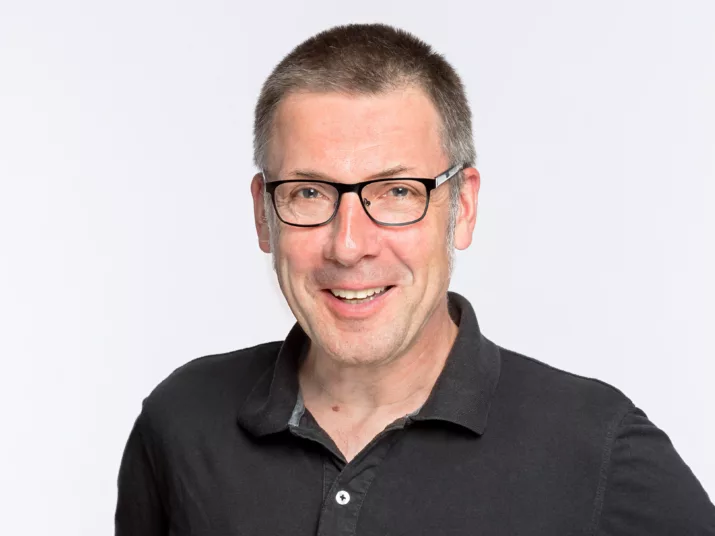
Professor Dr Niko Paech; photo: Michael Messal
INTERVIEW WITH ECONOMIST PROFESSOR DR NIKO PAECH
WHERE DO I START?
Buying something here, ordering something there – nowadays, we can’t escape the lure of consumerism. Is it at all possible for us to lead a more sustainable life in this sort of environment? Professor Dr Niko Paech from the University of Siegen in North Rhine-Westphalia explains how we can come to a consumption-free life – and why it’s worthwhile trying to get there.

Professor Dr Niko Paech; photo: Michael Messal
WHY DO HUMANS CONSUME?
Niko Paech: Consumption releases us from having to provide services autonomously. On top of this, objects of consumption perform three functions. Firstly, an objectively measurable one, for example to satisfy a physical need; secondly, an emotional one directed towards our inner lives in order to make us feel better; and thirdly, a symbolic one in which we use consumption to establish a relationship to the social structures surrounding us, regardless of whether it’s to associate ourselves with a certain group or to distinguish ourselves from one.
WHAT DOES CONSUMPTION DO TO US HUMANS?
Paech: We become dependent and vulnerable because we lose all autonomy to come to terms with what we can produce ourselves by virtue of our own abilities or together with others. In return for this impoverishment of our skills and abilities, we achieve increasingly higher levels of possession of technical and other equipment – at least so long as the industrial supply from outside doesn’t collapse and we don’t lose the sources of income necessary to buy these things.
ARE WE LIVING IN A CONSUMER SOCIETY?
Paech: Not only that – there is even increasingly a tendency whereby services that people used to provide for themselves are being transformed into objects of consumption. Nothing – with the exception of nuclear weapons, perhaps – has ever threatened human existence so much in its possibilities of long-term survival as the consequences of consumerism.
WHAT CAN WE DO TO COUNTER IT?
Paech: Policymakers could introduce the rule that each person may only be entitled to a certain quantum of resources and ecological capacity (for example, two tonnes of CO2equivalents per year). Civil society can become active by creating social networks and counter-cultures and promoting sufficiency pioneers who reject the more-more-more mania, confront ecological vandalism through their lifestyles and pressurise it to justify itself.
AND WHAT CAN EACH OF US DO INDIVIDUALLY?
Paech: We can cast off our ballast and ask ourselves what it is that we can break free from in terms of consumer temptations and decadent indulgences that cost us time, money and space. We should practice how to lead a manageable and decelerated life, while understanding simplicity and decluttering as liberation. People who live modestly are at peace with themselves, are more resilient and have less stress. They can work less because they need less money. The time freed up in this way can enhance their quality of life in diverse ways.
DO WE HAVE TO GIVE UP EVERYTHING?
Paech: No. It’s helpful to distinguish between our basic needs and luxuries. The latter can in turn be divided into harmful luxuries (air travel, cruises, unnecessary car journeys and new purchases, excessive meat consumption, too many electronic devices, etc.) and harmless luxuries (music, pub visits, parties, literature, hiking, sports, cycling, handicrafts, gardening, political and social involvement, etc.).
HOW DO WE STICK TO THESE PRINCIPLES?
Paech: Through practice and by forming groups whose members encourage one another to engage in behaviour that reduces the unnecessary. And if our individual eco-balances or carbon footprints finally reach a level that represents responsible behaviour in the global context – this can be easily estimated online with a CO2calculator and the Global Footprint Calculator – we provide a living example that can be copied by others.
HOW DOES LESS CONSUMPTION AFFECT THE ENVIRONMENT?
Paech: Nothing is better able to relieve the environment more than a sedentary and self-sufficient lifestyle. That’s because it comes with a direct effect (reduction of one’s individual ecological burden), an indirect effect (confrontation/inspiration of other individuals) and a tertiary effect in that the industry is deprived of its basis.
WILL WE ALL BE CONSUMING MORE OR LESS IN 20 YEARS FROM NOW?
Paech: Various crisis scenarios will simply eliminate our ability to continue to consume as much as we are doing right now. However, it’s impossible to assess precisely whether this will actually affect humankind as a whole or whether an elite will still be able to maintain its prosperity.